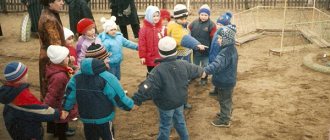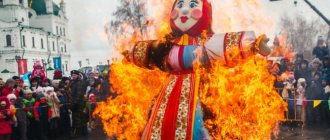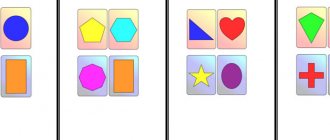Project on the topic: “Maslenitsa: history, customs and traditions of the holiday” for 2nd grade
Project goal: As part of the study of the subject “The World Around us,” to tell children and primary schoolchildren about Maslenitsa, explain the meaning of this holiday of the Russian people, and describe its main traditions.
Find information about the origin of the holiday, find out why Maslenitsa is called that. Prepare a report and presentation in the form of a photo story for elementary school students. Project plan:
- Introduction.
- History of Maslenitsa.
- Holiday traditions.
- Pancake week.
- Maslenitsa doll is a Slavic amulet.
- Conclusion.
- Example of a finished presentation
Project information
Development of cognitive and creative abilities of primary school students through familiarization with Russian folk traditions in the process of preparing and implementing the “Broad Maslenitsa” project in a school setting.
Relevance of the project
Russia is rich in its traditions, customs, and folk holidays. One of these holidays is the big folk festival at the end of winter, Maslenitsa. While studying the history of the holiday and Russian folk traditions in a traditional form, we encountered difficulties in primary school students fully perceiving and understanding historical material. How can we solve this problem?
While studying and mastering various methodological innovations, our attention was drawn to the “Pedagogical Workshops” technology. Being an integral part of the “Dialogue Interaction” technology, pedagogical workshops, in our opinion, are able to implement a consistent transition from a skill-based to a practice-oriented developmental model of teaching, taking into account individual characteristics, which is one of the conditions for fulfilling the Federal State Educational Standard.
The technology of pedagogical workshops allows us, through the organization of individual, pair, and group activities, to support students’ attention during the lesson, develop memory, associative, figurative and verbal-logical thinking, imagination and fantasy in the process of creating creative works.
Therefore, the use of technology in pedagogical workshops, as a way to develop the cognitive and creative abilities of primary school students, is of particular relevance.
The goal of the project is to realize the cognitive and creative abilities of elementary school students through the use of technology of pedagogical workshops and familiarization with Russian folk traditions in the process of preparing and holding the festive event “Broad Maslenitsa”
Role of the project – This project is aimed at developing the cognitive and creative potential of primary school students.
The form of organizing children's activities is Game at stations.
Tasks:
- (General) Immerse children in the atmosphere of celebration, give an idea of the culture and Russian folk traditions through thematic classes and master classes.
- (Educational) To acquaint primary school students with the traditions of the Russian folk holiday “Maslenitsa” through a demonstration of historical material using ICT.
- (Developmental) Through emotional empathy and participation in the game-action, introduce all participants to the tradition of the folk holiday Maslenitsa.
- (Educational) Cultivating students’ interest in Russian folk culture through master class technologies.
Direction of implementation : Introducing to Russian folk traditions through the integration of educational and extracurricular activities. Organization of training master classes, thematic classes with elements of art technologies and the use of ICT.
School structures participating in the organization and implementation of the project:
- School administration
- School teachers
- Engineering support service
- Medical escort service
Project characteristics
| By the nature of the result | production |
| By shape | Game by stations |
| By the nature of the activity dominant in the project | informational and creative role-playing game |
| By knowledge profile | extracurricular |
| By nature of coordination | with explicit coordination |
| By contact level | urban |
| By number of participants | group |
| By duration | medium term |
| By type of design object | existential |
Project results by target indicators
| No. | Indicators | Unit measurements | Indicator (quantity) |
| 1 | Total number of students involved in the implementation of the event | Human | 85 |
| 2 | Number of projects and initiatives proposed in the project | number | 8 |
Project Description
The project is aimed at introducing Russian folk traditions through the integration of educational and extracurricular activities.
Organization of training master classes, thematic classes with elements of art technologies. The main work on collecting information (the history of Maslenitsa celebrations) and preparing the festive event was carried out as part of extracurricular activities.
Participation in project activities contributed to an increase in the degree of socialization of students.
1. Benefit to students
- Students get acquainted with Russian folk traditions in an interesting and visually practical way.
- Gain skills in communication and interaction with social partners of the project.
- Students gain experience in applying the acquired knowledge in the process of subject-based practical activities at master classes with elements of art technology.
- Gain experience in participating in project activities.
- They experience emotional involvement in project work, a feeling of complete voluntariness and not coercion, ensuring a balance of self-organization and spontaneity, rational and intuitive components of their intellectual activity.
2. Benefit from school administration
- Replenishment of the school library with media resources on the history of Russian culture (presentations “History of the celebration of Maslenitsa”, “History of Russian costume”, “Traditions of Russian tea drinking”)
- As part of the project, educational and developmental teaching aids have been developed and produced to familiarize with Russian folk traditions (presentations “Traditions of Russian tea drinking”, “History of Maslenitsa celebration”, “History of Russian costume”), a didactic guide “Teapot”, three dolls on a plane ( women's Russian folk costume of the northern regions, men's Russian folk costume, women's Russian folk costume of the southern regions).
- Development of recommendations for introducing children to Russian folk traditions for parents and school teachers.
Main activities within the project
- Stage I. Development and creation of presentations aimed at introducing students to Russian culture within the framework of thematic weeks.
- Stage II. A series of thematic weeks held as part of extracurricular activities to familiarize students with Russian folk traditions (“History of the celebration of Maslenitsa”, “History of Russian costume”, “Traditions of Russian tea drinking”, “Russian folk games”)
- Stage III. Organization and implementation of the thematic week “Hello, Maslenitsa!”
- Stage IV. Conducting master classes as part of the festive event “Broad Maslenitsa”.
- V stage. Summarizing.
Report to the project
One of the most fun and popular holidays in our country is Maslenitsa. Otherwise it is called Farewell to Winter. After all, it is always celebrated at the junction between winter and spring. The celebration lasts a whole week and ends with a solemn event in the central square, during which funny fights, games, and the burning of effigy are held.
Story
Currently, Meat Week, as this holiday is otherwise called, is tied to the beginning of strict Lent in Orthodoxy. But initially it had nothing to do with Christianity, being a pagan holiday.
The ancient Slavs also rejoiced at the arrival of spring. For them, the spring equinox was a symbol of the beginning of the new year. They welcomed the arrival of spring with games and songs, and symbolically killed winter by burning its effigy.
When Christianity was adopted in Rus', the holiday changed. They adjusted him to new realities, he became quite Orthodox, foreshadowing the beginning of Lent.
Traditions
There are many traditions associated with Maslenitsa. Some are long gone, others have successfully assimilated into Christianity and are still popular today.
The main traditions of the holiday include baking pancakes, folk festivals with songs and jumping over a fire, burning an effigy symbolizing winter, climbing a pole to get gifts, and taking a snow town.
In the past, fun with the bear was often arranged, but now this tradition has sunk into oblivion.
Maslenitsa by day: when to bake pancakes and who to visit
The first three days of the holiday were devoted to household chores. At this time, preparations were made for the main celebrations.
So, on Monday , which was called “Meetings,” they began to bake pancakes, made a stuffed animal of Winter and drove it through the streets, showing it to the people. On this day, the father-in-law and mother-in-law were supposed to visit the matchmakers and treat themselves to pancakes.
Tuesday was called "Flirting". It was a day of celebration for young people, and family and friends were invited for pancakes.
The environment was called “Gourmand”. Her main tradition was for her son-in-law to visit his mother-in-law, who was supposed to feed him from the bottom of her heart.
The celebrations began on Thursday This day was called "Revelry". Household work stopped, games, skating, fist fights and the capture of snowy towns began.
Friday was called “Mother-in-law’s Party,” and on this day the son-in-law invited his wife’s mother to visit him and treated him generously to pancakes.
Saturday is called “Sister-in-Law’s Gatherings.” On this day, the daughter-in-law invited all her husband's relatives to the house and prepared a treat.
And finally, Sunday . The day that ends the holidays. It was called “Farewell to Maslenitsa,” and for Christians it was called Forgiveness Sunday. On this day, all the people flocked to the central square, where fun games, competitions, festivities are still held, and the culmination of the celebrations is the burning of effigy.
Maslenitsa doll
The main attribute of the holiday was and remains a doll that symbolizes winter. This doll was made from two crossed poles, which were upholstered with straw. Caracas dresses up in old, but bright clothes, a scarf is tied on the head, and a pancake or frying pan is given to the doll.
The doll is made the size of a person, and for greater resemblance, its face is drawn with charcoal, with a wide smile.
But in addition to the main, large doll, every house had to have its own, small one. This doll was considered a talisman against evil forces and was kept for a whole year. They made it similarly large, and burned it the next year.
Conclusion
At all times, people rejoiced at the arrival of spring and the end of severe winter frosts. For us, spring is a symbol of the rebirth of nature, a new dawn of life, and therefore now we greet it as joyfully as many centuries ago. And the main holiday of the arrival of spring remains Maslenitsa.
Pedagogical project “Broad Maslenitsa”
Songs and chants for Maslenitsa Come visit us, Maslenitsa, To the wide yard - Ride in the mountains, Roll in pancakes, Amuse your hearts! Maslenitsa Proskovey, Come to us as soon as possible. Spring is lucky, Spring is lucky, Red is lucky, Clear days, Frequent rains, Green grass, Red flowers, Warm days! Wide Maslenitsa! We boast about you, we go on roller coaster rides, we overeat on pancakes. Hey, Maslenitsa Kuroseika, give us a good ride! - Oil can, Oil can, haven’t you seen Gorasenka? - And Goraska in a red hat on a little black horse, waves her whip, and the horse dances under him. Like during Shrovetide Week, pancakes were flying out of the oven, and cheese, and cottage cheese - Everything was flying over the threshold. We had fun! You will get it too! You, my Maslenitsa, Red braid, light brown braid, Sister of thirty brothers, Daughter of three mothers, Come to my board house, have fun with your mind, and enjoy your speech. Come, honest Maslenitsa, Wide noblewoman, On seventy-seven sleighs, On a wide boat To the city to feast! Maslenitsa, climb the hill, Call the clear dawn to us. And at dawn - a nightingale, For a day, for a week. You didn’t come on Wednesday And you didn’t come on Friday. You came on Sunday, fun all week long. You came with goodness, With cheese, butter and eggs, With pancakes, pies and pancakes. Butter pancakes, greased Shangi. We ride from the mountain from dawn to dusk. And today on Sunday our fun will end. Goodbye, goodbye, Our Maslenitsa. Oh yes, Maslenitsa is moving into the yard, Wide is moving into the yard! And we, girls, meet her, And we, reds, meet her! Oh yes, Maslenitsa, stay for a week, Broad, stay for another! Maslenitsa: “I’m afraid of fasting!” Broad: “I’m afraid of fasting!” “Oh yes, Maslenitsa, fasting is still far away, Shirokaya, fasting is still farther away!” And we are waiting for Maslenitsa, We are waiting, in our souls, we are waiting. We'll see the cheese and butter in our eyes, We'll see it in our souls, we'll see it. Like a green oak tree on a hill, little greenery, in my soul, little greenery. And Vanyusha, my friend, is young, Young, my soul, young. Our Maslenitsa, be happy, Be happy, soul, be happy. Our little pea be rolling, Be rolling, soul, be rolling Oh, Maslenitsa, reach out! You cling to the oak tree, to the deck! Oh, they said - our Maslenitsa is seven years old, And in total Maslenitsa has seven days. Oh, Maslenitsa is a deceiver! She deceived me, cheated her, and didn’t let her have fun! Maslenitsa is walking on the ice, carrying a frying pan of pancakes. Take the young - Take it apart one by one! May the gods bless you to ascend the hill, to call for spring, to open summer, to close winter, to warm summer, to cold winter. Summer in the canopy, Winter in the sleigh. Cold Winter in a little place, Warm Summer in the street. And we waited for Maslenitsa, Stacked the mountain with cheese and butter, Oh, you, Maslenitsa stretched out and caught on to the white birch, And we saw off Maslenitsa. And we waited for Maslenitsa, We waited, in our souls, we waited. They stacked the mountain with cheese and butter, stacked it, soulfully, stacked it. And we celebrated Maslenitsa. We met, dear soul, we met. Oh, Maslenitsa, stretch out. Stretch out, soul, stretch out. And we saw off Maslenitsa. We saw off, in our hearts, we saw off. And we thought the oil can was seven weeks old, but there was only one day left from the oil can.








